Filipino Perspectives Digest: Gen Z hopeful for a bright Philippines, but have misgivings due to deep social divide
Filipino Gen Z are hopeful that the Philippines will have a bright future. However, their misgivings persist due to a deep social divide, which gets worse due to bad governance and marginalization.
According to the inaugural report of Filipino Perspectives Digest, the newest research project of WR Numero co-launched with PhilSTAR L!fe on Aug. 27, the Filipino youth believe unity is necessary for a country to progress and make their generation's visions realized.
With it, they think everyone would have a fair chance, conflicts would be minimized, and people would work together toward progress.
"For me, if people stand united... If people learn to be one with each other and have love for each other, there would be... calmness of the mind that wouldn't allow for conflicts," a youth participant from Leyte said. "If Filipinos have this, there will be no hostilities."
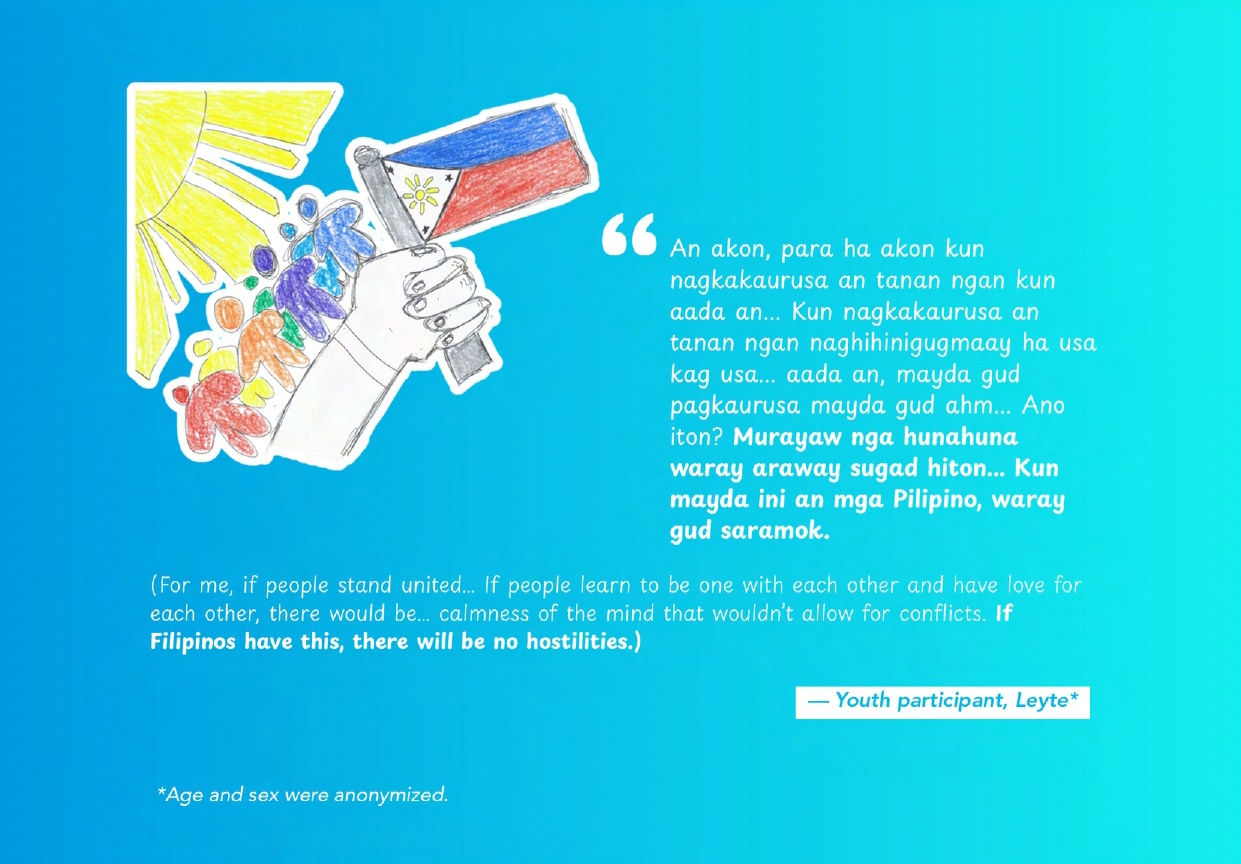
For Gen Z, what made things worse was the political rift between President Ferdinand "Bongbong" Marcos Jr. and Vice President Sara Duterte. They said the falling-out between the two most important national leaders is symbolic of the larger disunity in the country.
Ironically, the now-dissolved Marcos-Duterte tandem espoused "unity" in the 2022 national elections, so much so that it became a buzzword. Gen Z imagine a country in which the president and vice president are governing as equals and not rivals.
"[Sa drawing ko] makikita ninyo yung president and yung vice president is nakapatong sila sa podium, tapos may equal sign dito ibig sabihin pantay sila. Hindi sila naglalaban," a 22-year-old female participant from Metro Manila said.
"'Yung ideal na vice president at president ko mas kumbaga binibigyan nila ng focus or pinapahalagahan talaga nila ang issue tungkol sa mga kabataan and sa mga teachers as well," she added.
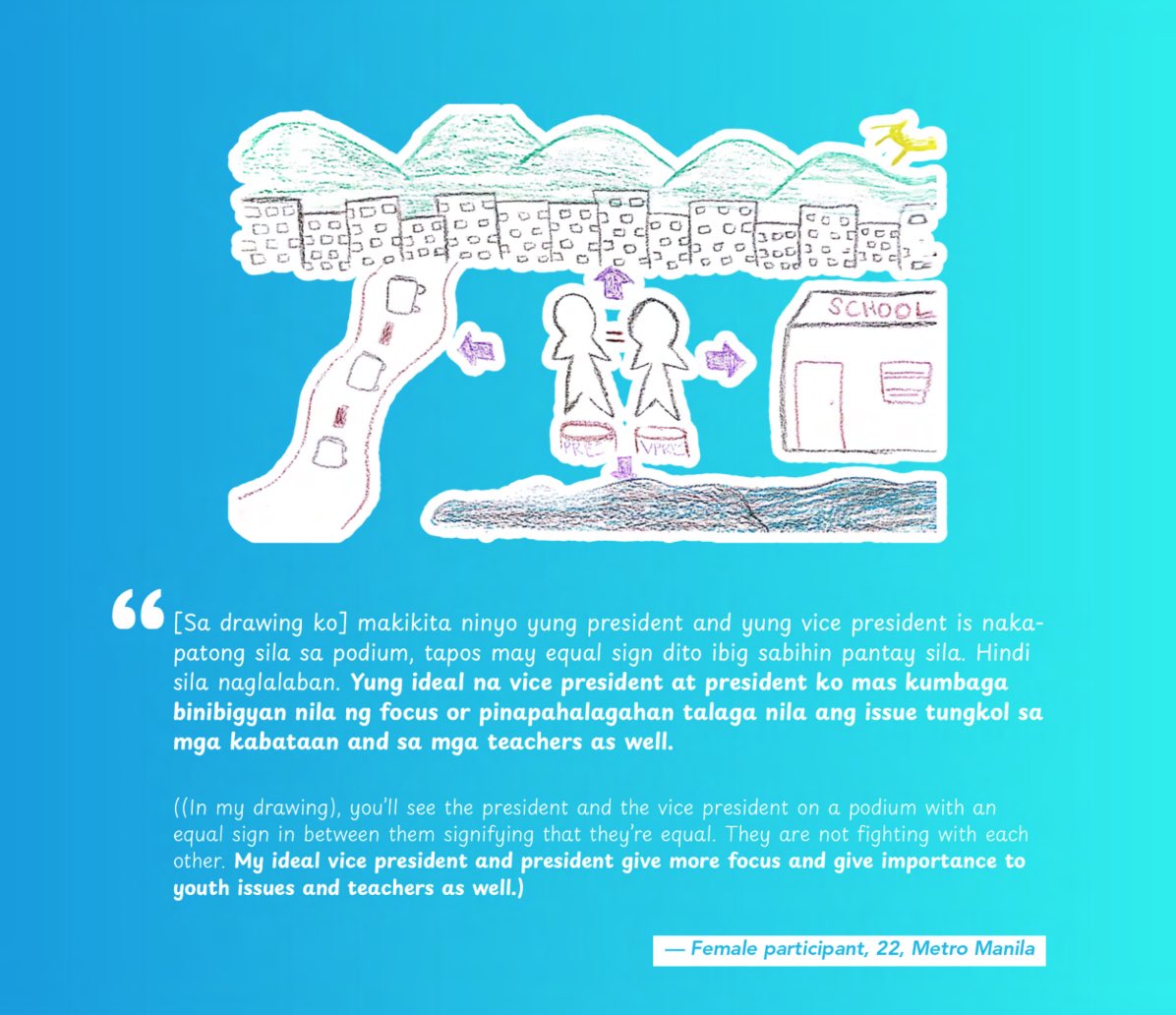
And in an increasingly polarized world—where economic disparities, social inequalities, and political divisions deepen every day—Gen Z see unity as both a solution and a necessity.
Inclusion on top of unity
The study also found that Gen Z deem inclusion as also important.
Some of them cited as an example the importance of Muslims and Christians coexisting peacefully.
Nevertheless, some preferred a separation of Muslim and Christian communities to allow each group to fully practice their respective cultures and traditions.
Others also viewed inclusion in the context of equal rights, particularly for the LGBTQIA+ community. For them, Filipino citizens—regardless of gender identity or sexual orientation—should participate meaningfully in society and feel protected by the law.
Gen Z also see inclusion as an essential leadership trait. They want leaders who make decisions that consider all citizens, ensuring that young people grow up in a nation that embraces each other and works together for its shared aspirations.
"[My ideal Philippines is] a country where people respect each other and may unity," a 23-year-old female participant from Tawi-Tawi said. "A place na may equal chance ano yung races mo and tribes. Kung meron kang respect for each and everyone, 'yung unity, easily lang siya ma-achieve."
Major role of student orgs, NGOs
To achieve their ideal Philippines, a majority of Gen Z emphasized the major role of student organizations and non-government organizations in engaging in advocacies. These include good governance, health, HIV awareness, and education.
They also stressed the importance of the Sangguniang Kabataan as a vehicle for championing change and realizing their aspirations for the country.
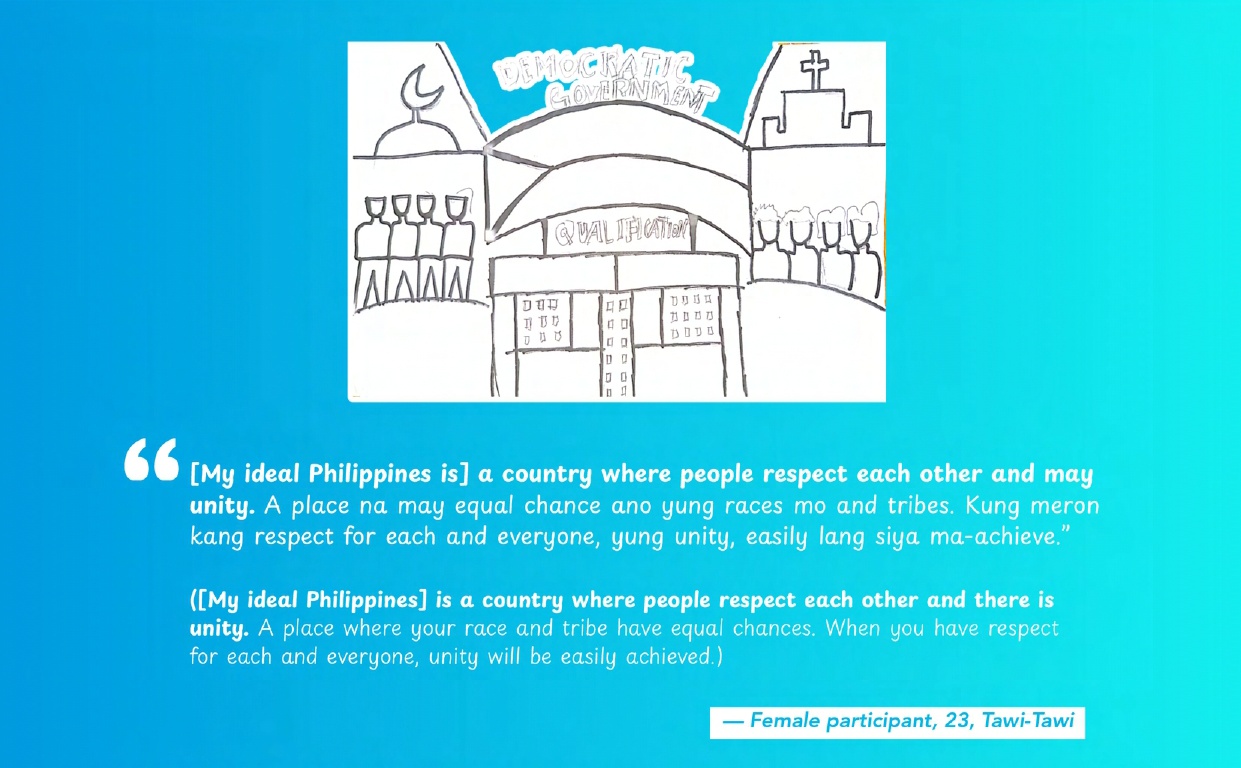
While some expressed willingness to volunteer or engage in civic action, the majority admitted that they would need "someone to push or motivate" them in engaging social issues. They also pointed out the lack of access to these organizations, especially outside of Metro Manila.
Some members of Gen Z, however, cited apprehensions in engaging with such organizations due to shyness, focus on personal lives first, and the perceived difficulty of balancing advocacies and their respective responsibilities.
"[Bago ako makilahok] dapat kailangan muna na parang may time din ako for that," a 22-year-old female participant from Camarines Sur said. "Until dumating 'yung such time na free na ako or available na ako or committed na ako to engage in such groups, hindi ako sasama doon [sa NGO] kahit maganda 'yung advocacies."
One participant even described participation in civil society organizations as a privilege accessible only to those with resources.
"I feel like it takes a lot of privilege to be part of those [efforts]," a 21-year-old male participant from Camarines Sur said. "Kasi hindi mo maiisip ang estado ng bansa directly kung hindi mo na-establish 'yung sarili mong survival."
"'Di mo ngayon makikitaan ng mga lokal na mamamayan na they become active on protesting. Kasi ang focus nila ay kung paano mabuhay, hindi kung paano maging bokal. Makikita mo sa mga aktibista, sa mga nag-poprotest ay mga may kaya," he added.
Hope deeply intertwined with anxiety
With that, Gen Z's hope for the Philippines is deeply intertwined with anxiety, swinging between cautious optimism and pragmatic idealism.
Though they remain hopeful, they know a systemic change is necessary for the nation's true advancement.
Their focus is on fixing what's broken rather than reinventing the system altogether.
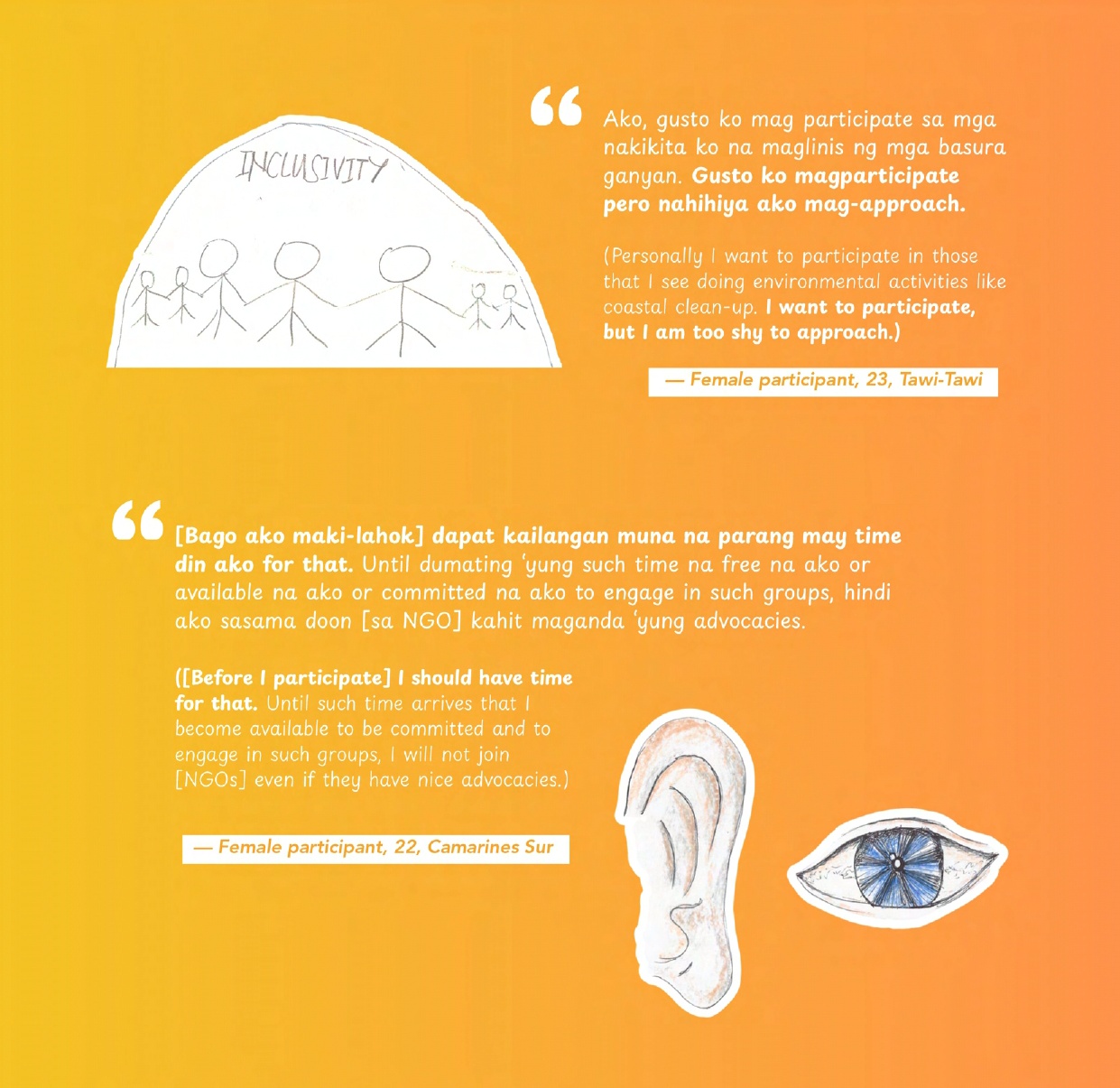
Gen Z are also aware that they aren't the primary agents of change in the country, believing that leaders and institutions still create the conditions of their success.
While most of them don't believe in the idea of a so-called generational duty to contribute to social change, many Gen Z are convinced that they may simply contribute individually, such as through hard work and success within their social circles.
"I feel like in order to execute personal change, we need not to be pessimistic about the Philippines," a 21-year-old male respondent from Camarines Sur said.
He, however, acknowledged that he cannot blame those who are pessimistic and those who opt to live in another country.
"But to have change, you should be hopeful about the Philippines, that this country can still change, that our progress is not backwards, and that we still have a chance. But it's really hard to think about it given that we're in this situation."
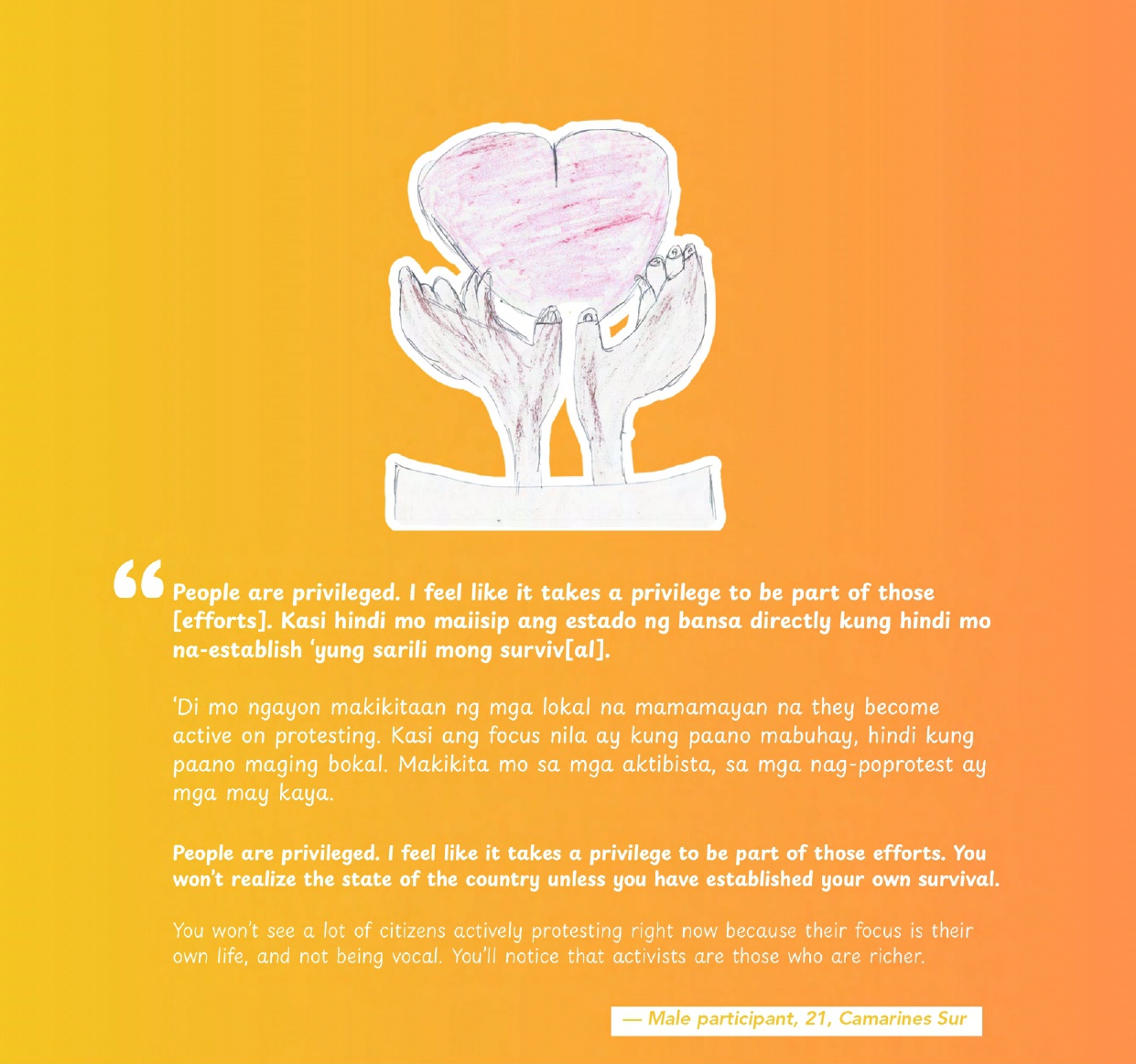
For Gen Z, brands must redefine their purpose as partners in building a more secure and sustainable future.
Advocates should advance their campaigns grounded in the shared hopes and struggles of the youth. Leaders in government and politics must uphold good governance and place the public good above personal gain.
Different sectors of society must also step up from being mere observers and aspirational figures to ultimately becoming active partners in creating change and in affording the youth the spaces they need to realize their ideal Philippines.
Background of the study
The inaugural issue of Filipino Perspectives Digest focuses on what it means to be Gen Z in today's Philippines. It highlights their aspirations, anxieties, and desires for a better nation—and how they think it can be achieved with the right tools, opportunities, and support.
For the project, WR Numero interviewed 46 individuals aged 18 to 25 hailing from various socio-economic backgrounds, gender identities, and geographic regions. The interviewees comprised 24 males and 22 females. In terms of SOGIE (sexual orientation, gender identity, and gender expression), 35 of them are straight, four gay, three bisexual, one queer, and one pansexual. Two individuals refused to disclose their SOGIE.
Instead of the typical survey, the research firm used focus group discussions, bringing people together in a facilitated conversation to allow for a deeper and more dynamic exploration of thoughts, emotions, and lived experiences.
The inaugural report's launch, held at Komunidad Hub in Bonifacio Global City, was hosted by L!fe's Generations columnist Angel Martinez and WR Numero's communications lead Jezryl Xavier Genecera.
It also saw an insightful panel discussion from youth advocates and industry leaders, including Asticom Head of Sales Cindy Burdette; Axcess PR General Manager Chescka Diaz; National Youth Commission Asec. Gervy James Gumarit; Grow School Philippines and Youth Uprising CEO Robyn Mijares; and youth influencer and advocate Janina Vela. They shared their thoughts on the key findings of the inaugural report, even as they reflected on how their respective industries can engage more meaningfully with young Pinoys. Joining the discussion were WR Numero Research President and CEO Cleve Arguelles and Filipino Perspectives Digest's lead researcher Beatriz Beato.
Martinez and Genecera, who are also Gen Z, moderated the discussion.
Future installments of the Filipino Perspectives Digest will explore other themes, all ensuring that diverse voices in Philippine society will be heard. Get a copy of its inaugural issue here.
See what transpired during its launch in partnership between WR Numero and PhilSTAR L!fe here. Check out its key findings here.


